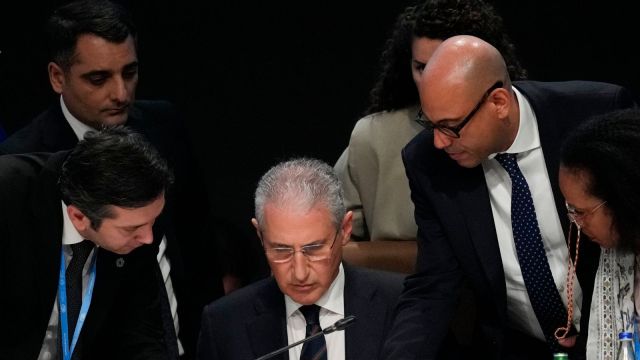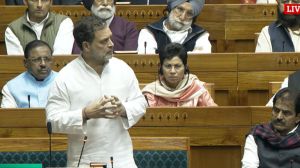Stay updated with the latest - Click here to follow us on Instagram
UN climate talks secure $300 billion annual fund for developing nations in landmark deal
The deal is viewed as a foundation for encouraging developing nations to set more ambitious climate goals, which are due early next year as part of the global effort to curb emissions.
 Yalchin Rafiyev, Azerbaijan's COP29 lead negotiator, left, Mukhtar Babayev, COP29 President, center, and Simon Stiell, United Nations climate chief, talk ahead of a plenary session at the COP29 U.N. Climate Summit, Sunday, Nov. 24, 2024, in Baku, Azerbaijan. (AP)
Yalchin Rafiyev, Azerbaijan's COP29 lead negotiator, left, Mukhtar Babayev, COP29 President, center, and Simon Stiell, United Nations climate chief, talk ahead of a plenary session at the COP29 U.N. Climate Summit, Sunday, Nov. 24, 2024, in Baku, Azerbaijan. (AP)At the United Nations climate talks held in Baku, Azerbaijan, countries have reached a critical agreement to channel at least $300 billion annually into the fight against climate change.
This funding is aimed at assisting developing nations in transitioning away from fossil fuels, adapting to climate impacts, and addressing the damage caused by extreme weather events. While the agreed amount falls short of the $1.3 trillion requested by developing countries, it triples the $100 billion yearly target set in 2009, which is now expiring.
“This is a step in the right direction, and there’s hope for additional funding in the future,” said Biman Prasad, the chief of Fiji’s delegation. “Everyone is committed to an agreement, even if not all parties are entirely satisfied”, reported Associated Press (AP).
The deal is viewed as a foundation for encouraging developing nations to set more ambitious climate goals, which are due early next year as part of the global effort to curb emissions. Under the 2015 Paris Agreement, countries pledged to periodically enhance their commitments to limit global warming to 1.5°C above pre-industrial levels. The planet has already warmed by 1.3°C, and emissions continue to rise.
Advocates hope this agreement will attract further funding from multilateral development banks and private sources. Rich nations have argued that public funds alone are insufficient, while poorer countries fear that loans could exacerbate existing debt crises. Ani Dasgupta, President of the World Resources Institute, remarked: “The $300 billion goal is not enough but represents an important down payment on a safer, more equitable future.”
The final agreement increased the figure from an initial $250 billion proposal, which was rejected by several nations, including African countries and small island states.
Negotiations also addressed Article 6 of the Paris Agreement, which establishes markets for trading carbon credits. Proponents claim this system could generate an additional $250 billion annually in climate finance.
However, critics argue the carbon market rules are weak and may allow major polluters to evade meaningful emissions cuts. Greenpeace’s An Lambrechts described it as a “climate scam” filled with loopholes.
(with inputs from AP)
- 01
- 02
- 03
- 04
- 05































